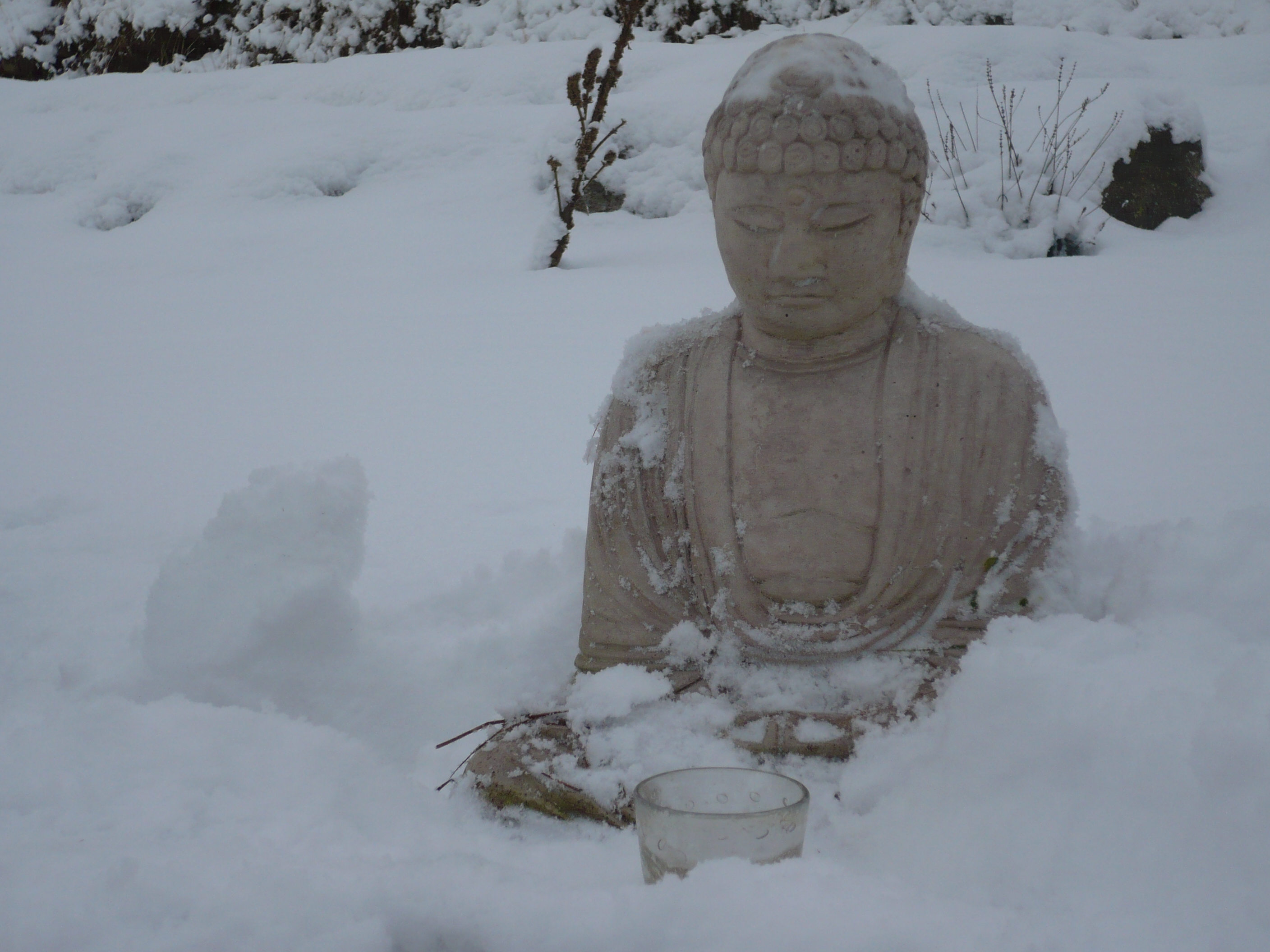Has there ever been a Miss World candidate who hasn’t declared her wish for world peace? How admirable, how marvellous, to behold the nobility and compassion of the bikini-clad, doe-eyed tiara-aspirant! Such ambition! Such gravitas! Such shiny teeth!
But imagine the ripples through the universe of beauty pageantry if one of these paragons of female wondrousness turned around and expressed a more humble desire. Nothing so grand as a lullaby cocktail to soothe the tantrums of the wailing world but rather a more modest, attainable hope. What if she wished for not world peace, but inner peace? That, surely, would make headlines across the globe: “Miss World Traitor Says ‘Screw You, World’ As She Prioritises Self-Improvement!” But where would this poor naif begin?
Before we can answer that we should perhaps try and define what we mean by ‘inner peace’. I tend to equate it with self-contentment. If you are at peace with yourself then you are content with who and where you are, you have managed to quench the majority of those internal blazes that have raged throughout your life. You have come to terms with yourself. And as soon as I see an expression like ‘come to terms’ I immediately think of a negotiation. Someone who has found inner peace therefore, has negotiated terms with themselves. They have found an accommodation with whatever it is that has haunted them. The $64,000 question for our beauty queen is how?
I believe acceptance paves the road to inner peace. Where then, does acceptance start? Perhaps in the admission of imperfection. The desire to fix things in a permanently perfect state is at best optimistic immaturity and at worst, a dictatorship. Neither is balanced, both suffer from a skewed perspective and they both involve heavy casualties. When we admit something it is both concession and confession, the act of owning up, of taking responsibility and it comes more easily to some than others. It can be very challenging to admit to what we perceive as our own failings. It is also difficult to admit that the failings of others have impacted on us in profound and life-altering ways. Here admission can be thought of as ‘allowing entry to’. So, can you allow entry to imperfection in your life? I can hear your answer – “why the hell would I want to do that!” which is a reasonable response when all you’re trying to do is keep it together and carry on with some semblance of sanity. Bear with me and I will try and elucidate this murky area.
In the past when people I love and care about have hit the wall I have had buckets of empathy to offer. My learning curve involved developing the ability to extend that empathy to myself when I was in a similar situation. The objective followed this line of thinking: I am imperfect. I cope with my imperfection by learning to have empathy for myself. If I can have empathy for myself, accepting and forgiving my own flaws, I aspire to extend that empathy to those around me who are also struggling with their imperfections, especially those whose imperfections impact upon me. I become less reactionary and less judgmental which leaves me in a calmer, more positive place. That is a place from which it is easier to engage with something approaching real tolerance and real forgiveness. Is it easy? Hell, no! But it can be immeasurably rewarding.
For me, grief is at the heart of this empathy I have just mentioned. And what is grief but the feeling and expression of sadness over a terrible wound? That wound can manifest itself in so many ways, perhaps none more definitive than the loss of a loved one, grief pouring into the space that has been left behind. But there are other injuries and grievances, other sources of pain. I believe we endure a great many wounds of different shapes and sizes over the period of our lives. We stumble like sightless monoliths, crashing and colliding, knocking chunks of matter from each other’s flanks as we meander awkwardly through existence. So much unintentional damage is wrought as we blunder our way from one unwittingly painful encounter to the next. You can wait for the pain to disappear all by itself or even live in hope that someone else will somehow alleviate your suffering but the bottom line is that only you know how bad it is because no one else but you can feel exactly what you’re feeling. The neglected wound is the one that may do the most damage. Are you willing to look straight at it and admit your pain and the feelings of anger and resentment that may accompany it? Feeling squeamish, hurt, afraid? There are two approaches that might be advised.
The first, most common one is best articulated thus: “Stop feeling sorry for yourself, get on with it!” The alternative that I am advocating is the opposite. Feel sorry for yourself. Grieve for your wounds. A huge source of our frustration with the world or the life or the people we feel have wronged us is their inability to recognise or acknowledge their part in our pain. Pain that has defined us as people. Pain that has affected our decisions and the paths we have subsequently taken. As we live with our wounds and slowly come to realise that the world (or the person) is carrying on regardless the inevitable conclusion descends that the wounds in question must not be very important and so we relegate them to a lesser division that gets virtually no fanfare at all. Eventually the wounds are put out of our minds altogether where they coalesce into an all-powerful repression bomb. It is denial by a thousand cuts. Congratulations! Your wound now wields an inordinate amount of power over you, power it has been bequeathed by your inability to express pain.
So, grieve. Grieve!
Give yourself permission to be your own caregiver. Grieve for the passing of your loved one. Grieve for the loss of love. Grieve for the irreparable friendship. Grieve for the sibling conflict. Grieve for the unloved or unloving parent. Grieve for your fears. Grieve for your failures. Grieve for your failings. Grieve for whatever it is that lies at the source of your wound. It is your attempt to heal yourself. To forgive yourself. To accept yourself. It is not an act of ego or vanity but of humility because you are admitting your smallness, your vulnerability, your capacity to feel pain. And how do we learn care if we do not know hurt? Don’t let your wound bleed you dry; take power from how you learn to restore yourself and take pride in putting yourself on a better path.
The path of acceptance and forgiveness. The path hopefully, to inner peace.




Thank you Dara, thank you for this insight. It is exactly what I need to read and do. You have a beautiful gift of words, emotion and clarity. Bless you and yours x
Thanks Mel, that’s lovely feedback. Be well. x
Agree fully buddy; expressed perfectly.
Nice one Matt, thanks for the thumbs up!
Excellent words xx
Why, thank you, most excellent cousinissima. Muchas smoochas, Dxxx
Well said Dara. You sure have the gift!!
Lots to consider and take on board!!
Love you heaps!!
Martsxx
Thanks Marts. Lovely to have your heaps of love! Dx
Ah now,you are getting too good at this,do give up the day job.Sean
Thanks Sean, it looks like I have given up the day job! Now I just need to work out how not to slide back down the slope…
[…] finally, as a little follow-up to my post from a few weeks ago on the benefits of grieving here’s a link to a lovely piece in The New York Times that echoes many of the sentiments I […]
What a powerful call for kindness to ourselves – we are automatically intolerant of our own weakness and impatient for sadness to pass. Really enjoy your writing Dara. So glad I stumbled across your blog – insomnia has its rewards!
Hey Liz, lovely to hear from you! It’s been quite a while, hasn’t it… I hope life is treating you well and that your insomnia is a temporary situation. Still, nice that it garnered a little response for me auld blog.
Thanks for getting in touch,
Dx
Ah the insomnia comes and goes. I get the 4.20 am sudden wake up sometimes – shockingly precise! All good though really. I’ve three small human beings attached so it’s busy and I write a bit when I manage to carve a little time. Glad to see you being so creative and I see from another blog you have a little girl – a friend for all your life. I’ll keep reading. Take care
xL
[…] to Settle for Less and a very recent one could be How Not to Settle for Less. Others, on grief – How to Cry for Pain, and on becoming a father – How to Cry for Joy could be part of a series. A couple of posts on […]